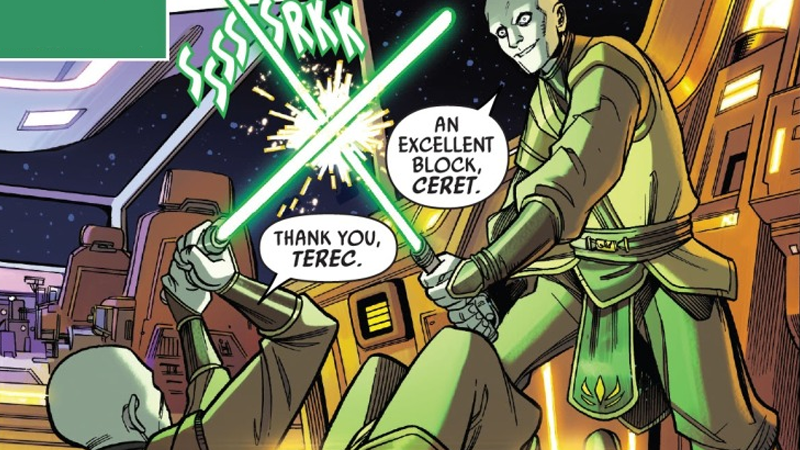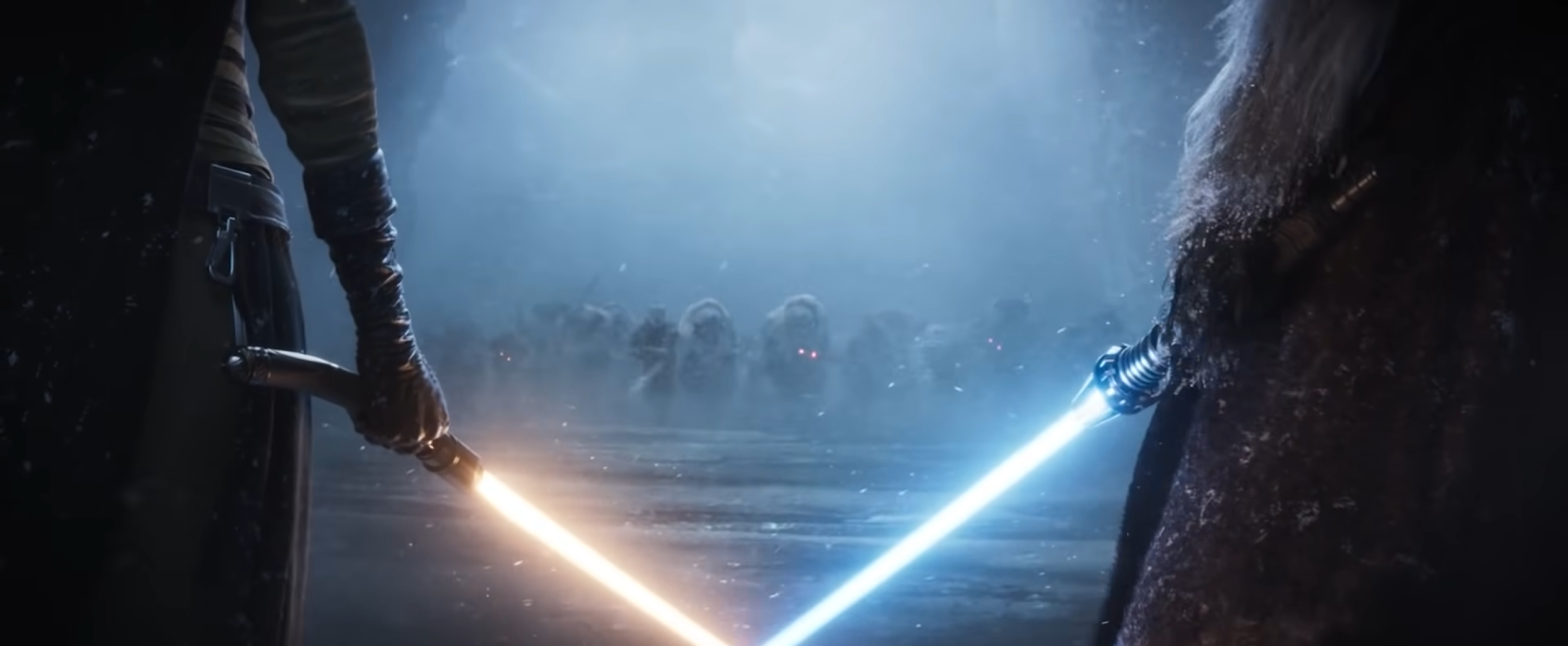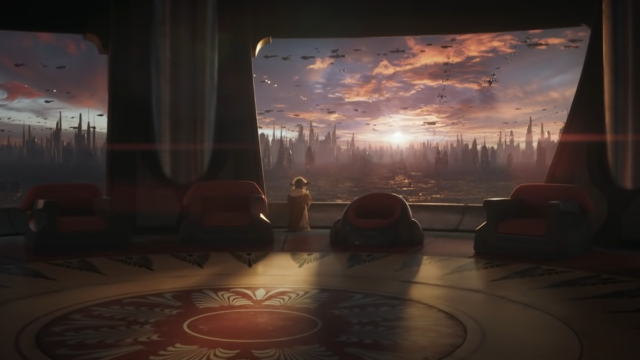Last week at the Game Awards, host Geoff Keighley introduced the first of many game reveals of the night. “I hope you’re ready,” the host teased, before revealing a cinematic trailer for Star Wars Eclipse, a new action game set in the franchise’s recent The High Republic publishing initiative. What Keighley and perhaps many Star Wars fans themselves were not expecting was the reaction to who was making it.
“I was thrilled to see footage of a game that felt reminiscent of so many great, classic Star Wars games,” Chase, a queer Star Wars fan who creates LGBTQ-themed content about the Skywalker Saga online under the handle ThatGayJedi, told Gizmodo over email about their reaction to seeing Eclipse’s reveal live this past Thursday. “It was easy to get caught up in the epic shots, music, and fresh storyline! I was stoked.”
Little is currently known about Eclipse. The trailer — viewed over eight million times already on the official Star Wars YouTube channel — is entirely cinematic, with no gameplay or story details. There are cryptic shots of Jedi practicing with lightsabers, Neimoidians and Trade Federation starships, glimpses of Yoda, alien drummers, strange planets, and a mysterious, ooze-covered figure. But what is known, and came as the biggest surprise of the trailer, was how it ended: confirmation that the game is being developed by French studio Quantic Dream. Founded by David Cage and Guillaume de Fondaumière in 1997, the Paris-based studio is best known for its technology-pushing, choice-driven, narrative-heavy video game style, including games like Fahrenheit, Heavy Rain, and more recent titles like the Eliot-Page-starring Beyond: Two Souls and the clunky sci-fi social justice allegory Detroit: Become Human.
But in more recent years the studio has been embroiled in controversies beyond the quality of its games and the stories they want to tell. In 2018, a joint investigation by French press outlets Le Monde, Canard PC, and Mediapart reported wide-ranging claims of a toxic workplace culture at the studio, including accusations of a culture of crunch (the practice of intense overtime work by staff in the run-up to release of a title), the violation of French labour laws by the studio’s HR department, and more. But the reports also levelled a series of disturbing allegations about founders Cage and de Fondaumière, claiming that the developers perpetuated a provocative and bigoted culture of harassment at Quantic Dream.
At the time, Quantic Dream denied the allegations found in the reports, and then a week later took two of those outlets, Le Monde and Mediapart, to court, suing them for libel. The case was ongoing for a number of years, wrapping up a few months ago in a mixture of success and failure for both Quantic Dream and the journalists it targeted. The French courts sided in favour of Quantic Dream in its libel case against Le Monde in September 2021 over the joint investigation with Canard PC and Mediapart, but it simultaneously sided against the studio in its case against Mediapart — the courts citing that Mediapart had successfully proved its practices in reporting the investigation — failing to refute the wider reporting about Quantic Dream’s misconduct.
“I actually learned about Quantic Dream’s reputation and a little bit about the accusations against them after watching the trailer,” Chase said of the studio’s involvement in Star Wars. “First, I learned about them just bit by bit through some semi-critical tweets and then, later, I learned a whole lot more through my own research on David Cage, Guillaume de Fondaumière, and Quantic Dream as a company.”
It wasn’t just allegations of Quantic Dream hosting a toxic workplace environment that irked Star Wars fans, though. As has been made clear in recent years and through important investigative reporting, the video game industry on a considerable scale has long had issues with perpetuating cultures that fostered sexist, homophobic, and bigoted attitudes, and studios have long wrestled with the nature of labour issues such as union organisation and crunch — in this regard, the allegations against Quantic Dream are not an exception to the wider industry. The flashpoint for shock at the thought of the studio getting its hands on the galaxy far, far away, however, instead centered on alleged comments by David Cage in particular that were raised during the court case earlier this year. While appearing before the court in June 2021, Cage reportedly stormed out of the courtroom in tears after being made to hear a lawyer read out a list of alleged statements he had made to Quantic Dream staff.
“Anyway, in my games, all women are wh***s,” was one such purported statement read out during the trial, according to the independent French union Solidaires Informatique. Others purportedly included “In the open space, there is a lack of tits,” and “At Quantic Dream, we don’t make games for f**s.” Quantic Dream and its founders denied the allegations found in the reports in 2018, before bringing Mediapart and Le Monde to court in the same year. Separately, an individual employee took Quantic Dream to court in July 2018, suing the studio for damages citing that an alleged toxic work environment–including accusations of derogatory edited images being shared by staff of them–had lead to an unfair dismissal. Although the case was initially decided in the employee’s favour, in April 2021 the French Court of Appeals overturned the case, asking the employee to pay compensation to Quantic Dream totalling €10,138 (roughly $US11,450 ($16,011)).
Cage’s direct level of involvement with Star Wars Eclipse is unknown, outside of the Writer/Director sharing its trailer on social media with the message that he was “happy to reveal” Eclipse to the world, and that “having the chance to contribute to this amazing franchise is a dream come true.” We’ve reached out to Quantic Dream to clarify Cage’s relationship with the game, and for further commentary on their legal cases this year, but did not hear back by time of publication. But with or without his involvement, for some Star Wars fans, Quantic Dream being Lucasfilm Games’ latest partner in expanding its production on games set in the galaxy far, far away was less of a dream and more of a nightmare because of these allegations — especially for queer fans like Chase.
“It has been a weird roller coaster of processing to go on as a queer fan… my immediate thoughts about Quantic Dream developing Eclipse — before I understood the scope of the allegations against them — were more along the lines of, ‘Eh, whatever. People are hateful but the game will still be made and people will still buy it,’” they continued. “And, to be clear, I’m not proud of that initial response I had–but I feel it’s important to share that initial response honestly and openly because, to me, it shows just how normalized homophobia, sexism, and racism [in fandom spaces] have become. And not only normalized, but lauded and rewarded. We have been conditioned to reward this kind of behaviour by giving people [who engage in it] platforms, contracts, and our own, personal, money.”
“I’m extra frustrated and heart broken that this game is set during the High Republic time period. The game developers’ work culture seems to go against everything that Lucasfilm has worked so hard at building in this time period,” Bryan, a host on the queer-focused Star Wars podcast Pink Milk alongside Chase, told Gizmodo separately over email. Not only has Bryan been disappointed in Lucasfilm’s partnership with Quantic Dreams, but in some Star Wars fans excited by Eclipse reacting with hostility to himself and other queer people disappointed by the title’s developers, after Pink Milk spoke out against the studio. “The idea that we’re asking for a social agenda just makes me very upset. I’ve been out for 24 years and I’m just growing tired of this conversation,” Bryan continued. “We’re not asking for a social agenda, we’re asking to sit in the front seat with everyone else. I’ve found myself this past few days wanting people who are on the other side of the table from me to express to me why they think they’re better than me and why they feel that I don’t belong [in the Star Wars fandom].”
io9 received emails from several fans wishing to remain anonymous that expressed similar thoughts to ones Bryan was concerned about — that drama surrounding the announcement was overblown, that concerns were either fans pushing a left-leaning “cancel culture” agenda or simply seeking something, anything to complain about with Star Wars. But in many other responses from fans, Chase and Bryan’s reactions to Eclipse are far from isolated. “I’ve been so happy with the new High Republic content Star Wars has been putting out because we finally have gotten away from the Skywalker saga and we are getting more insight into what the Republic was like during its Golden Age. So I was so excited to see the Eclipse trailer. It has drama, looks beautiful and seems really intriguing. But when I saw it was Quantic Dream, I was upset,” one fan told Gizmodo over email. “I feel like Lucasfilm has been getting into these traps where they release something that looks really incredible, but there’s some very big, glaring issue that they definitely know about, but they go along with anyway. In this case, partnering with Quantic Dream.”
“I grew up as a gay man during the height of the AIDS crisis. I have recently been diagnosed as being on the autism spectrum which explains so much of my childhood. It was very hard for me to navigate a world queer on the spectrum (undiagnosed) when I had no one to help me. Creative outlets like D&D and Star Wars were my solace,” another, BJ, shared. “However, when these nerdy sources of comfort encountered others all the neurotypical cis white bro culture and virulent homophobia were there. On the internet these metastasized. The trailer for Eclipse is exciting. I am very keen to play it, but yet, here we are. I cannot stop thinking about this game and my ambivalence [towards its developer].”

Over the weekend some Twitter users in the Star Wars fandom rallied around the hashtag #BlackoutStarWarsEclipse — which sprouted out of conversations Chase and Bryan had discussing Eclipse on the Pink Milk podcast last week.
“The way the hashtag has started taking off has been one of the most healing aspects of this entire situation,” Chase added. “Outside of the occasional and unthinking hate I receive online because of this push, it’s actually been an incredibly moving thing to see how the hashtag has grown and gained momentum. The allyship is strong with this hashtag, and I couldn’t be more grateful. And its allyship on so, so many fronts.”
The hashtag focuses on the critique of allegations from Quantic Dream’s lawsuits that have emerged in the past three years. But it also serves as a space for fans to share their dismay at not just Quantic Dream handling a Star Wars game, but a High Republic game in particular. The still-nascent publishing initiative — launched in early 2021 as a series of interconnected novels and comic book series exploring a previously-untold period of Star Wars history, approximately 200 years before the events of the Star Wars movies — has become a space that pushed forward Star Wars’ rocky history with queer representation. In the last year of the initiative’s storytelling alone, queer people of multiple gender and sexual identities have been important characters in the stories told in High Republic’s world at a rate unlike anything previously seen in Lucasfilm’s previous attempts, or lack thereof, to incorporate queer characters and storytelling into the Star Wars universe. For fans like Chase and others, the fact that Eclipse is set in a queer-friendly Star Wars setting like The High Republic makes Quantic Dream’s involvement all the more hurtful.
“The High Republic is genuinely the most diverse part of Star Wars canon. There are well written people of colour, women, queer people and so much more and we’ve not had representation on this scale on Star Wars to date,” another fan, Lou, told Gizmodo over email. “The key authors behind The High Republic have all worked incredibly hard to make this representation work in an otherwise frankly quite toxic fandom, and having Quantic Dream is a slap in the face to the writers and all the fans who are BIPOC, queer, or women. Quite honestly, we already get very little representation [as queer people], and seeing something that is finally for us be handed to this kind of company is just sad. I won’t be buying the game even though High Republic is my favourite era of Star Wars.”
“Star Wars has always been an uplifting, liberal and inclusive franchise… in theory. More often than not, however, it shies away from ‘pulling the trigger’ on giving loud voices to PoCs, and queer people in their live action developments,” Gustavo Acosta, a host on the Puerto Rican fan podcast Triad of the Force, added. “This is why The High Republic has been such a big deal for a lot of us. It has been a welcome change in Star Wars in the sense that it puts all groups in the forefront of representation. It’s an inclusive era, but more than that it’s an inclusive community [of fans] that has been thrilled and passionate about The High Republic… it’s very exhausting to see the same thing happen with Star Wars over and over again: Lucasfilm afraid of real substantive change, and catering to toxic corners of the fandom that want minority and queer voices gagged and unrepresented.”

For now, Quantic Dream, Lucasfilm and Lucasfilm Games have remained silent about reaction to Eclipse’s announcement. A request made by Gizmodo to Lucasfilm about the reaction to Eclipse’s announcement last week has so far remained unanswered (we will update this report if we hear back). But in a period of transition for the Star Wars franchise at large — as it pivots away from a mixed reception to the end of the Skywalker saga in 2019 to nostalgia-driven fan-focused projects on Disney+ like this month’s The Book of Boba Fett and next year’s Obi-Wan Kenobi — the company’s silence on issues of representation to queer fans, and which collaborators it shares the Star Wars universe with, is made more deafening by the day.
“The story told in the Eclipse trailer seems to be an exciting one–any story building upon what the authors of the High Republic novels have built sounds thrilling to me. I would love for that story to be passed on to a new developer, if possible–and not just any developer, but a developer that can continue a legacy of Queer representation in Star Wars video games (and video games in general),” Chase concluded.
“At the bare minimum, though, I want to be heard and validated by Lucasfilm. I want Lucasfilm to acknowledge and apologise for the hurt they have caused and for them to show us some empathy and understanding of what has been an archaic and egregious decision.”
